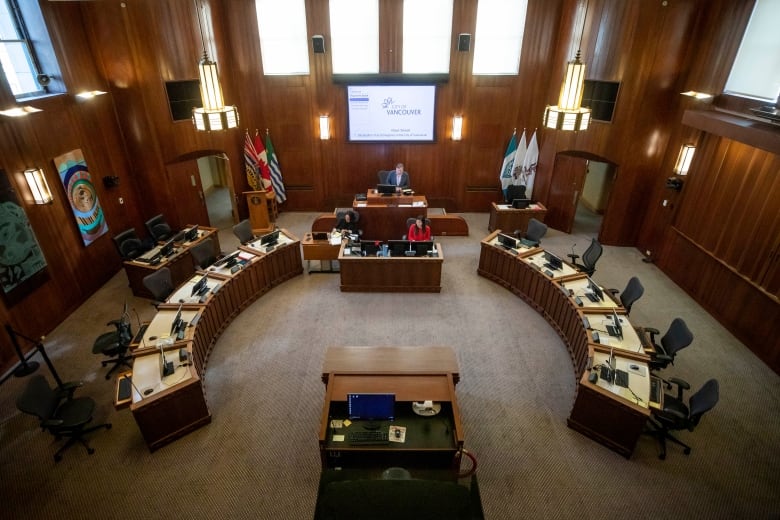Vancouver council unanimously passes state of emergency
Powers allow city to take over buildings, buy new equipment on a first-priority basis

The City of Vancouver has formally declared a state of emergency, giving it expanded powers it hopes will allow it to deal with the ongoing effects of the COVID-19 outbreak.
"It's very surreal to me, the time's that we're in," said Coun. Melissa De Genova, who spoke to the unanimous support for the motion at a special virtual council meeting Thursday.
The city passed the emergency declaration through the Vancouver Charter and has asked the province for the following powers:
- Acquiring or using land or personal property to prevent, respond to or alleviate the effects of the emergency.
- Buying on a first-priority basis any clothing, equipment, medical supplies or other essential supplies.
- Restricting the use or occupancy of any premises within the City of Vancouver.
City manager Sadhu Johnston said the powers requested would give city staff the flexibility and resources needed, but that more powers could be requested in the future.
"This is not to be intended to be used on a broad scale … what this allows us to do is restrict certain activities in businesses as deemed appropriate," he said.
"This is a proactive step. It's very important that people continue to heed the guidance … and pursue the social distancing and the other measures they're outlining."

No word on eviction ban or business help
Mayor Kennedy Stewart said examples of measures the city could take under an emergency included closing restaurants not obeying orders around social distancing, or taking over parts of facilities to help ensure homeless people can self-isolate.
But he said that the city would be looking to the province on measures to freeze evictions during the COVID-19 outbreak.
"We believe the better jurisdiction is the province," said Johnston.
"I know many people are asking that. We are looking at our own charter authority, and whether that's something we can pursue. At this point, we're not recommending to do that … but it's something we're looking to see whether we can do."
Several councillors said if the city should attempt to move on the issue if the province failed to act quickly.
"We desperately need eviction protection," said Jean Swanson. "If Doug Ford can do it, I don't see why John Horgan can't."
There were also questions about what measures the city could take to help small businesses, but staff said much of that would come from the federal government's $82 billion economic aid package.
"We recognize the business community is obviously strained," said Johnston.
"Our focus as organization right now is to maintain our essential services. To make sure that when you turn on a tap, water comes out … that when there's a fire, there are firefighters to fight it."
What's still open?
Delta and New Westminster have also declared local states of emergency. Earlier this week, virtually every municipality in B.C. closed community centres for the indefinite future, and in recent days, some municipalities have begun closing their city halls — though the largest ones in Metro Vancouver remain open.
Vancouver's Evelyne Saller, Carnegie and Gathering Place community centres remain open for essential services.
The City of Surrey also announced Thursday it would be shutting down day camps and daycares in city facilities to the general public effective next Monday, though the daycares will remain open to families of first responders.
But Mayor Doug McCallum said regular city hall services would remain open, and encouraged people to go outside.
"Continue enjoying outdoor spaces, including our parks, playgrounds and beaches," he said.
"Get out in the fresh air, but do so by being mindful of social distancing."
If you have a COVID-19-related story we should pursue that affects British Columbians, please email us at impact@cbc.ca.